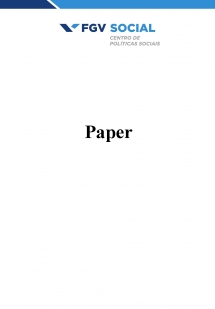
Microinsurance: Income Risk, Social Security and the Demand for Private Insurance by Low-Income Families - Neri, Marcelo Cortes
Sobre o paper:
Insurance provision against uncertainties is present in several dimensions of peoples´s lives, such as the provisions related to, inter alia, unemployment, diseases, accidents, robbery and death. Microinsurance improves the ability of low-income individuals to cope with these risks. Brazil has a fairly developed financial system but still not geared towards the poor, especially in what concerns the insurance industry. The evaluation of the microinsurance effects on well-being, and the demand for different types of microinsurance require an analysis of the dynamics of the individual income process and an assessment of substitutes and complementary institutions that condition their respective financial behavior. The evaluation of the microinsurance effects on well-being, and the demand for different types of microinsurance require an analysis of the dynamics of the individual income process and an assessment of substitutes and complementary institutions that condition their respective financial behavior. The Brazilian government provides a relatively developed social security system considering other countries of similar income level which crowds-out the demand for insurance and savings. On the other hand, this same public infrastructure may help to foster microfinance products supply. The objective of this paper is to analyze the demand for different types of private insurance by the low-income population using microdata from a National Expenditure Survey (POF/IBGE). The final objective is to help to understand the trade-offs faced for the development of an emerging industry of microinsurance in Brazil.




